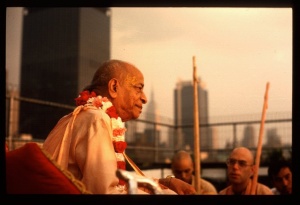CC Madhya 14.5 (1975): Difference between revisions
(Vanibot #0027: CCMirror - Mirror CC's 1996 edition to form a basis for 1975) |
(Vanibot #0020: VersionCompareLinker - added a link to the Version Compare feature) |
||
| Line 2: | Line 2: | ||
<div style="float:left">'''[[Sri Caitanya-caritamrta (1975)|Śrī Caitanya-caritāmṛta (1975)]] - [[CC Madhya (1975)|Madhya-līlā]] - [[CC Madhya 14 (1975)|Chapter 14: Performance of the Vṛndāvana Pastimes]]'''</div> | <div style="float:left">'''[[Sri Caitanya-caritamrta (1975)|Śrī Caitanya-caritāmṛta (1975)]] - [[CC Madhya (1975)|Madhya-līlā]] - [[CC Madhya 14 (1975)|Chapter 14: Performance of the Vṛndāvana Pastimes]]'''</div> | ||
<div style="float:right">[[File:Go-previous.png|link=CC Madhya 14.4 (1975)|Madhya-līlā 14.4]] '''[[CC Madhya 14.4 (1975)|Madhya-līlā 14.4]] - [[CC Madhya 14.6 (1975)|Madhya-līlā 14.6]]''' [[File:Go-next.png|link=CC Madhya 14.6 (1975)|Madhya-līlā 14.6]]</div> | <div style="float:right">[[File:Go-previous.png|link=CC Madhya 14.4 (1975)|Madhya-līlā 14.4]] '''[[CC Madhya 14.4 (1975)|Madhya-līlā 14.4]] - [[CC Madhya 14.6 (1975)|Madhya-līlā 14.6]]''' [[File:Go-next.png|link=CC Madhya 14.6 (1975)|Madhya-līlā 14.6]]</div> | ||
{{CompareVersions|CC|Madhya 14.5|CC 1975|CC 1996}} | |||
{{RandomImage}} | {{RandomImage}} | ||
==== TEXT 5 ==== | ==== TEXT 5 ==== | ||
<div class="verse"> | <div class="verse"> | ||
:sārvabhauma-upadeśe | :sārvabhauma-upadeśe chāḍi' rāja-veśa | ||
:ekalā vaiṣṇava-veśe karila praveśa | :ekalā vaiṣṇava-veśe karila praveśa | ||
</div> | </div> | ||
| Line 18: | Line 17: | ||
<div class="synonyms"> | <div class="synonyms"> | ||
sārvabhauma—of Sārvabhauma Bhaṭṭācārya; upadeśe—under instructions; | sārvabhauma—of Sārvabhauma Bhaṭṭācārya; upadeśe—under instructions; chāḍi'-giving up; rāja-veśa—the royal dress; ekalā—alone; vaiṣṇava-veśe—in the dress of a Vaiṣṇava; karila praveśa—entered. | ||
</div> | </div> | ||
| Line 25: | Line 24: | ||
<div class="translation"> | <div class="translation"> | ||
Following Sārvabhauma | Following Sārvabhauma Bhaṭṭācārya's instructions, the King had given up his royal dress. He now entered the garden in the dress of a Vaiṣṇava. | ||
</div> | </div> | ||
| Line 32: | Line 31: | ||
<div class="purport"> | <div class="purport"> | ||
Sometimes members of the International Society for Krishna | Sometimes members of the International Society for Krishna Consciousness-especially in the Western countries-find it difficult to approach people to distribute books because people are unfamiliar with the traditional saffron robes of the devotees. The devotees have therefore inquired whether they can wear European and American dress before the general public. From the instructions given to King Pratāparudra by Sārvabhauma Bhaṭṭācārya, we can understand that we may change our dress in any way to facilitate our service. When our members change their dress to meet the public or to introduce our books, they are not breaking the devotional principles. The real principle is to spread this Kṛṣṇa consciousness movement, and if one has to change into regular Western dress for this purpose, there should be no objection. | ||
</div> | </div> | ||
Latest revision as of 08:37, 27 January 2020

A.C. Bhaktivedanta Swami Prabhupada
TEXT 5
- sārvabhauma-upadeśe chāḍi' rāja-veśa
- ekalā vaiṣṇava-veśe karila praveśa
SYNONYMS
sārvabhauma—of Sārvabhauma Bhaṭṭācārya; upadeśe—under instructions; chāḍi'-giving up; rāja-veśa—the royal dress; ekalā—alone; vaiṣṇava-veśe—in the dress of a Vaiṣṇava; karila praveśa—entered.
TRANSLATION
Following Sārvabhauma Bhaṭṭācārya's instructions, the King had given up his royal dress. He now entered the garden in the dress of a Vaiṣṇava.
PURPORT
Sometimes members of the International Society for Krishna Consciousness-especially in the Western countries-find it difficult to approach people to distribute books because people are unfamiliar with the traditional saffron robes of the devotees. The devotees have therefore inquired whether they can wear European and American dress before the general public. From the instructions given to King Pratāparudra by Sārvabhauma Bhaṭṭācārya, we can understand that we may change our dress in any way to facilitate our service. When our members change their dress to meet the public or to introduce our books, they are not breaking the devotional principles. The real principle is to spread this Kṛṣṇa consciousness movement, and if one has to change into regular Western dress for this purpose, there should be no objection.